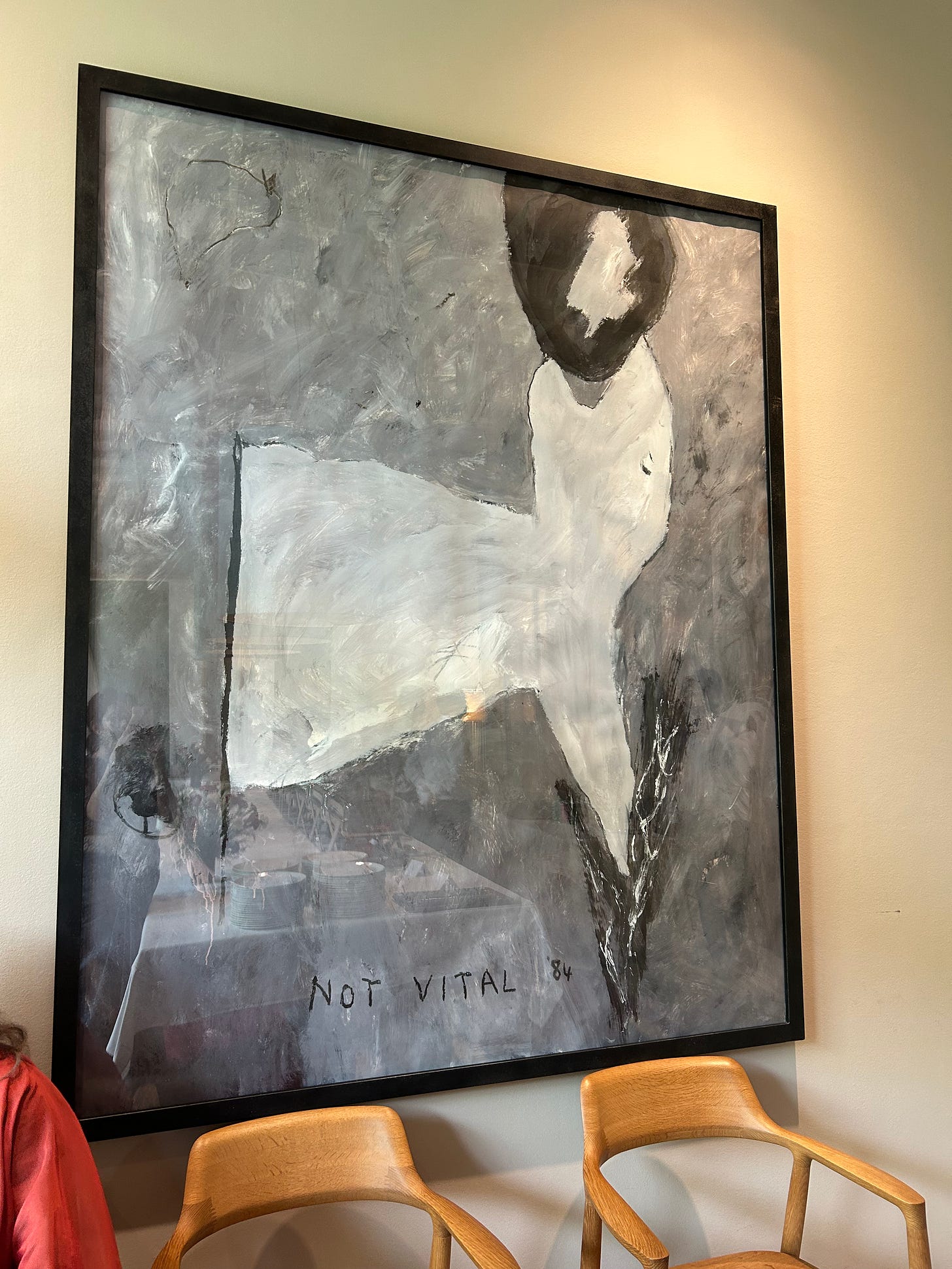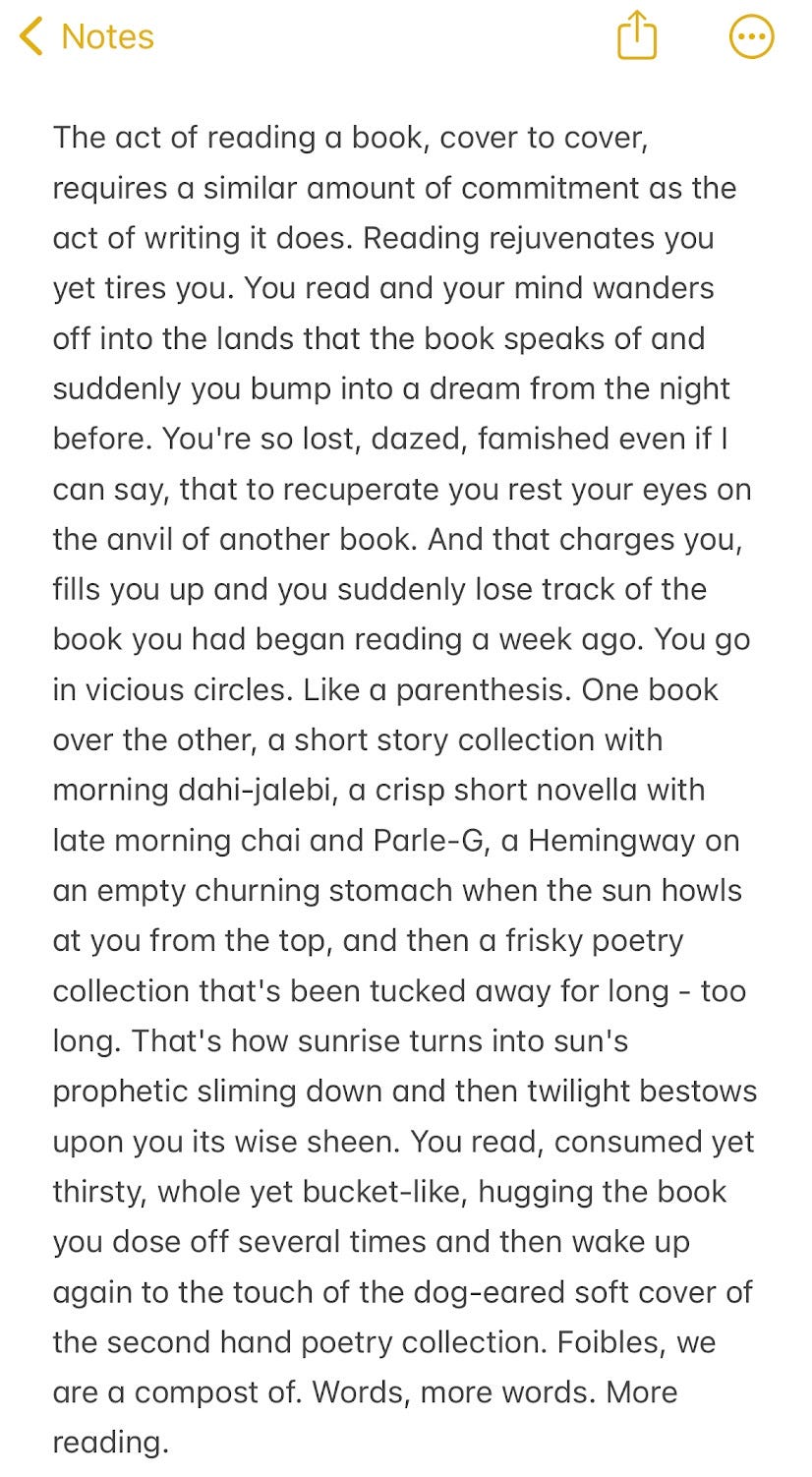#Scurf149: My writing was changing with age, and I kept notes**
Allowing writing and thinking to exist, even foment, like mildew in an otherwise drab life
Does a writer choose what they want to write? I think not.
“When I was twenty-one,” wrote Zadie Smith at age twenty-five, “I wanted to write like Kafka. But, unfortunately for me, I wrote like a script editor for The Simpsons who’d briefly joined a religious cult and then discovered Foucault.”
Just like Smith, when I was in my early- and mid-twenties, sitting on the edges of Indian journalism, I found myself constantly looking out, waiting for a chance to break in, for the big, fat by-line. Then, I wanted to write that feature story that gets picked up for one of the two journalism awards in the country. Or that is read by and is praised unanimously by the small circle that English language journalism is in India. At the very least, I wanted to arrive at a story, an idea, a pitch that no one had thought of before. I wanted to do so much, confined in my abilities first as a beat reporter, then as a sub-editor for about four years.
While I did find immense pleasure in reading and polishing other people’s work, it often felt like the work was not doing complete justice to my passion.
More than anything else, it was not about me.
Everything around was about others. Other people’s ideas, other people’s valour in pursuing them, other people’s language, other people’s mistakes, other people’s writing.
As much as I hated attention otherwise, I would not have minded it half as much if it came in relation to my writing. When I did pitch ideas, they were either too cumbersome for me to pursue alongside a desk job, or people higher up, easily threatened, and insecure, would nip them in the bud. I was demotivated, flattened, losing vigour by the hour.
Different life experiences—a student away from home, a practicing lawyer, a student overseas, a working professional—conjure certain fixed expectations. I wanted to be able to write about all of them. But those years in journalism started chipping away at my tendency to lean towards writing. Suddenly I felt a heaviness, as if I did not belong there. I had far too many ideas that could not be sustained on the page. And I began to wonder: What happens if I write none of them? Do I even have a voice without an idea?
In those four years, I read longform essays, narrative nonfiction, memoirs, all the while jotting down meaningful sentences, thinking that they would set me off on a path of inspiration, one way or the other. In my daydreams I would think that whenever I do get a chance to write, I would set down page after page about my writerly obsessions: longing, depression, and the deep pathos of being constantly misunderstood. But what I did end up writing, whenever I could, for the weekend features magazine were shoddy reviews, interviews, and routine reportage. It was unimaginative, drab and sucked the soul out of me (and maybe also the readers). Soon, I started feel a pang of ruin, fearing that this was how I would lose interest in writing, by reading my own uninspired work.
Tired of being constantly pushed against the wall, when I did quit journalism in January 2020, it felt instantly better. It was as if I’d quit caffeine. Suddenly, I was sure about one thing at least and that was that I didn’t want to be a journalist. At that moment, just a couple of months before the pandemic started, journalism felt mired in a haze of favouritism (nepotism’s bastard child), politics and bickering. Leaving it I felt light and renewed, even.
As I joined my job as a communications professional, I started scheduling my days differently. I would sneak out the weekends solely for thinking, writing, and reading for myself. Slowly, when I started sending out pitches, they were for essays and not baroque features ideas that I had earlier wanted to report on.
Eventually I discovered that the issue that animated my life (imaginative, living and writing) in the truest sense was women’s commute. I had been a walker all my life and had seldom come across other women while walking. Suddenly it felt necessary for me to write about my walks as a woman (and how they’d freed me). It felt important to note the various lacks that women like me faced.
Nonplussed at my own ideas, in essay after essay, I wrote from the lens of my privilege, my experience, and my gender. It felt natural and I think I wrote decently.
In the Indian writing ecosystem, I had never read anyone write about walking with this kind of untamed attention, in which everything else dissolves into the margins, and the world mediated exclusively through memories of my walks.
Three years into freelancing, alongside a day job, I can already sense the germs of newer preoccupations. While I might not be able to put a finger on what they exactly are right now, this whole situation does make me realise that ideas, inspirations, just like thoughts and feelings, are shapeshifting. They evolve with age, and if the mind is kept engaged and active in fields of interest, then they also come to fruition.
It is this way that a creative person’s mind works.
I’d always been one for changing over time, evolving, and maturing, by self-doubt, experience, and multiple other things, and when this extended into my writing life, it only felt natural. I understand now that this evolution of ideas implies my departure from set notions, shared benchmarks, and agreed-upon, appropriate levels of being a “writer”.
My ideas could spring from anywhere, they could be about anything under the sun. They could have similar themes threading through them, but that didn’t mean they were all not different from one another.
Each of these essays that I have written is important to me, and had the pitches been accepted, I would’ve written twice the number more for the same reason.
I’ll tell you a secret about working a full-time job while wanting to be a writer: it’s a lot of waiting around, usually all day, all night, all week, basically lifelong. During the day I wait for the evening to draw, and work hours to be over, as if all of my work life is just a dressing room rehearsal for my writing life.
Being a writer, a freelancer, essayist and critic, I realized that I take my night job as seriously as my day job. This meant that I could not judge myself or my ideas at all. Nothing was big or small. One pitch couldn’t be undersold because it was a riff on the sky or nature. Another wouldn’t be overstated for its political resonances. I learned to trust my mind as far as it traveled for ideas.
There’s a passage in Elisa Gabbert’s essay “Writing That Sounds Like Writing” that I’ve thought about often since I read it. She notes that she had always enjoyed excess in art,
“But as I’ve gotten older I’ve come to appreciate much “quieter,” subtler poetry. Part of me worries this is like rich people getting rid of all their stuff, the intellectual equivalent of mistaking asceticism for refinement. The Marie Kondo craze is basically the opposite of horror vacui — fear of empty space versus fear of bounty. Minimalism versus maximalism, simplicity versus complexity.”
Here Gabbert riffs on how there are endless ways to conceive an essay, or for that matter, any piece of writing. I can set words to paper about my feelings, emotions, myself in my early twenties, while I could write about the world, feminism, and desires at an older age. As long as I let my mind think and furnish me with ideas, it should be fine.
Perhaps it is also a feminine guilt of writing not what I had once envisaged I would write about. When I published my first two essays in 2020, people told me that I was writing too much about myself. Maybe it is the woman’s guilt of succumbing too easily to the slightest bit of external criticism.
Lauren Elkin in her essay “Bad Genre” writes,
“But, as we well know, the critical stakes are not the same for men as they are for women when it comes to writing the self. Where he creates a lucid, inventive world, she is told she cannot see beyond her own navel.”
I had wanted to be a writer ever since I learned what that word meant. But then, I also wanted to be an actor and a schoolteacher. Over the years I kept my mind attuned to its interests, likes and dislikes. Whenever I felt at sea, I helped myself back to the reading-writing waters suturing the gap swiftly. I never wandered too far off, keeping my writing mind engaged to be as close to reading, writing in whatever way. Had I saved the journals I scribbled on as a kid, I would’ve known what my childhood writerly obsessions were. But would I hold myself against those too? I don’t think so.
Over the last half a decade I have kept myself actively engaged in the business of reading and writing. In doing this, I have lent structure to my writing life. This process has also helped me realize that writerly preoccupations will never be the same at all points in life.
In writing, just like life we mature and come to our own. The writing life will not always be the dreamy, café-trotting one paraded in pop-culture, but one where the mind is sharp and attuned to what it likes. And my life already shows that.
**Wrote this essay in 2022
Essays I enjoyed reading this week:





